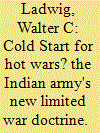| Srl | Item |
| 1 |
ID:
080676


|
|
|
|
|
| Publication |
2007.
|
| Summary/Abstract |
In response to the perceived inability of the Indian military to leverage its conventional superiority to end Pakistan's "proxy war" in Kashmir, the Indian Army announced a new offensive doctrine in 2004 intended to allow it to mobilize quickly and undertake limited retaliatory attacks on its neighbor, without crossing Pakistan's nuclear threshold. This Cold Start doctrine marks a break with the fundamentally defensive military doctrines that India has employed since gaining independence in 1947. Requiring combined arms operating jointly with the Indian Air Force, Cold Start represents a significant advance in India's conventional military capabilities. Yet, despite the Indian Army's intentions, it risks provoking or escalating a crisis on the subcontinent that could breach the nuclear threshold. Recent military exercises and associated organizational changes indicate that although the Indian Army has made progress toward developing an operational Cold Start capability, particularly in the area of network-centric warfare, the doctrine remains in the experimental stage. Nevertheless, this is a development that deserves further study. As the Indian Army enhances its ability to achieve a quick military decision against Pakistan, the political pressure to employ such a strategy in a crisis will increase-with potentially catastrophic results.
|
|
|
|
|
|
|
|
|
|
|
|
|
|
|
|
| 2 |
ID:
101018


|
|
|
|
|
| Publication |
2010.
|
| Summary/Abstract |
All three branches of the Indian armed forces have recently articulated the need to operate beyond the country's immediate borders. While the Indian military is highly unlikely to achieve its more ambitious power projection objectives in the medium term, the conventional wisdom that India's traditional foreign-policy orientation precludes military power projection is untenable, especially for an aspiring regional hegemon.
|
|
|
|
|
|
|
|
|
|
|
|
|
|
|
|
| 3 |
ID:
112188


|
|
|
|
|
| Publication |
2012.
|
| Summary/Abstract |
In recent years the Indian Ocean has received significant attention from the defence-intellectual community in the United States. However, the actual strategic importance of the region to US interests is less clear. In an environment of fiscal austerity, if commitments abroad are not firmly linked to interests, any significant involvement in a region of secondary concern could contribute to 'imperial overstretch'. The 'Neo-Nixon Doctrine' outlined here calibrates American interests and regional commitments by devolving primary responsibility for regional security to the major democratic powers in the Indian Ocean, whom the US would bolster with aid and advice.
|
|
|
|
|
|
|
|
|
|
|
|
|
|
|
|
| 4 |
ID:
080788


|
|
|
|
|
| Publication |
2008.
|
| Summary/Abstract |
From 1964 to 1975 a small group of British officers, advisors, and trainers guided the forces of the Sultanate of Oman to victory in their conflict with the Marxist insurgents of the People's Front for the Liberation of the Occupied Arabian Gulf (PFLOAG). This campaign provides a clear example of how to effectively support an ally's counterinsurgency efforts with a minimal commitment of men and material. In particular, the critical assistance provided by the British consisted of experienced leadership and skilled technical support personnel as well as a viable strategy for victory. However, more important for the ultimate success of the counterinsurgency campaign was the emergence of new progressive leadership with the accession of Sultan Qaboos. The most important lesson from this study is that while security assistance can reinforce positive political efforts, it is not enough on its own to bring about a victory in an unfavourable political environment
|
|
|
|
|
|
|
|
|
|
|
|
|
|
|
|
| 5 |
ID:
083418


|
|
|
|
|
| Publication |
2007.
|
| Summary/Abstract |
The lack of an institutional capacity and a legal authority to train foreign police forces is undercutting U.S. security assistance in the war on terror. From Iraq to Afghanistan to the Philippines, effective police forces are a key component of efforts to combat insurgency. This article discusses the importance of effective policing to counterinsurgency, briefly explores the history of American police assistance during the Cold War, and proposes a means by which, for a fraction of what it spends annually on military assistance programs, the United States can leverage domestic police academies to provide high-quality support and assistance to foreign law enforcement agencies.
|
|
|
|
|
|
|
|
|
|
|
|
|
|
|
|